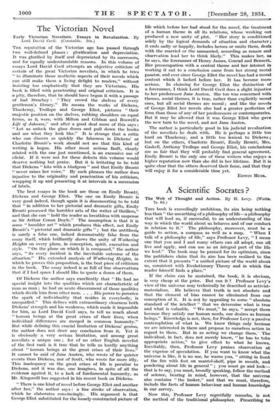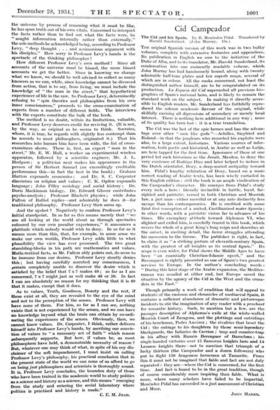A Scientific Socrates ?
THIS book is exceedingly ambitious, its aim being nothing less than " the unearthing of a philosophy of life—a philosophy that will lead us, if successful, to an understanding of the way in which the world about us behaves and of our conduct in relation to it." The philosophy, moreover, must be a guide to action, a compass as well as a map. " When I talk of a philosophy of life," says Professor Levy, " I mean one that you and I and many others can all adopt, can all live and apply, and can use as an integral part of the life we lead." The book may be praised for its optimism, since the publishers claim that its aim has been realized to the extent that it presents " a unified picture of the world about us, consistent with Evolutionary Theory and in which the reader himself finds a place."
If the claim can be sustained, the book, it is obvious, is very cheap at the .price. But can it ? Professor Levy's view of the universe may technically be described as activist- materialism. He believes that truth is not absolute and that the element of bias cannot be eliminated from our conception of it. It is not by appealing to some " absolute standard of the intellect " that we determine what is true and what is valuable. " We must," he says, " accept them because they satisfy our human needs, our desires as human beings." Knowledge is not, then, for Professor Levy a passive contemplation of what is. We know things only because we are interested in them and propose to ourselves action in regard to them. But in so acting we change them: The individual, in fact, does not merely know, " he has to take appropriate action," to give effect to what he knows. Inevitably, then, Professor Levy praises observation at the expense of speculation. If you want to know what the universe is like, it is no use, he warns you, " sitting in front of the fire with feet on mantel-shelf, pipe in mouth, and pondering about life in general " ; you must go and look— that is to say, you must, broadly speaking, follow the method of science, bearing in mind, however, that the universe also contains " the looker," and that we must, therefore, include the facts of human behaviour and human knowledge in our survey.
Now this, Professor Levy regretfully remarks, is not the method of the traditional philosopher. Prescribing to
the universe by process of reasoning what it must be like, he has spun truth out of his own vitals. Concerned to interpret the facts rather than to find out what the facts were, he " sought information internally rather than externally," the sole methods he acknowledged being, according to Professor Levy, " deep thought . . . and acrimonious argument with 'his disciples." How sorry in Professor Levy's hands is the spectacle of the thinking philosopher !
How different Professor Levy's own method ! Since all accounts of the universe must be biased, the more biased accounts we get the better. Since in knowing we change what we know, we should be well advised to collect as many 'mowers as we can, while, since knowledge cannot be divorced from action, that is to say, from living, we must include the knowledge of " the man in the street," that hypothetical experieneer of life in the raw. So Professor Levy, determinedly refusing to " spin theories and philosophies from his own inner consciousness," proceeds to the cross-examination of experts from a number of different fields. The interviews with the experts constitute the bulk of the book.
The method is no doubt, within its limitations, valuable, and Professor Levy deserves credit for reviving it. (It is not, by the way, so original as he seems to think. Socrates, whom, it is true, he regards with slightly less contempt than he accords to most philosophers, originated it.) That his researches into human bias have been wide, the list of cross- examinees shows. There is, first, an expert " man in the street," Mr. E. W. Hall, a worker on experimental wireless apparatus, followed by a scientific engineer, Mr. J. L. Hodgson ; a politician next makes his appearance in the person of Sir Herbert Samuel (an exceedingly creditable performance this—in fact the best in the book) ; Graham Hutton expounds economics ; and Dr. S. C. Carpenter discourses on religion and values ; C. K. Ogden expounds language ; John Pilley sociology and social history ; Dr. Doris Mackinnon biology. Dr. Edward Glover contributes psycho-analysis ; Professor Blackett physics ; while John Fulton of Balliol replies—and admirably he does it—for traditional philosophy. Professor Levy then sums up.
And the upshot ? Negatively to confirm Professor Levy's initial standpoint. In so far as this means merely that " we are all looking at the world about us through spectacles coloured by our own peculiar experiences," it announces a platitude which nobody would wish to deny. In so far as it means more than this, that, for example, in some sense we make our own worlds, Professor Levy adds little to what plausibility the view has ever possessed. The two great stumbling-blocks in his path are mathematics and values. Mathimatical facts, as Mr. Fulton ably points out, do seem to be immune from our desires. Professor Levy stoutly denies this ; but having carefully searched my consciousness, I remain completely unable to discover the desire which is satisfied by the belief that 7 x 7 makes 49 ; so far as I am concerned, 7 x 7 might just as well make 48 or 50. In fact I can see absolutely no reason for my thinking that it is 49 that it makes, except that it does.
As to values, Truth, Goodness, Beauty and the rest, if these exist at all, they are revealed to the eye of the mind and not to the perception of the senses. Professor Levy will have none of them. For him, so far as I can see, nothing exists that is not experienced by the senses, and we can have no knowledge beyond what the brain can obtain by co-ordi- nating the experiences of the senses. Obviously, then, we cannot know values. Dr. Carpenter, I think, rather delivers himself into Professor Levy's hands, by ascribing our convic- tion of values to " a necessary act of faith " which reason subsequently supports. But how, if values be, as most philosophers have held, a demonstrable necessity of reason ? But, whatever one may think of what, in spite of his coy dis- claimer of the soft impeachment, I must insist on calling Professor Levy's philosophy, his practical conclusion that in the present state of the world we can none of us afford to go on being just philosophers and scientists is thoroughly sound. It is, Professor Levy concludes, the bounden duty of those who have been trained in the academic world to study politics as a science and history as a science, and this means " emerging from the study and entering the social laboratory where politics is practised and history is made."
C. E. M. Joan.



































 Previous page
Previous page